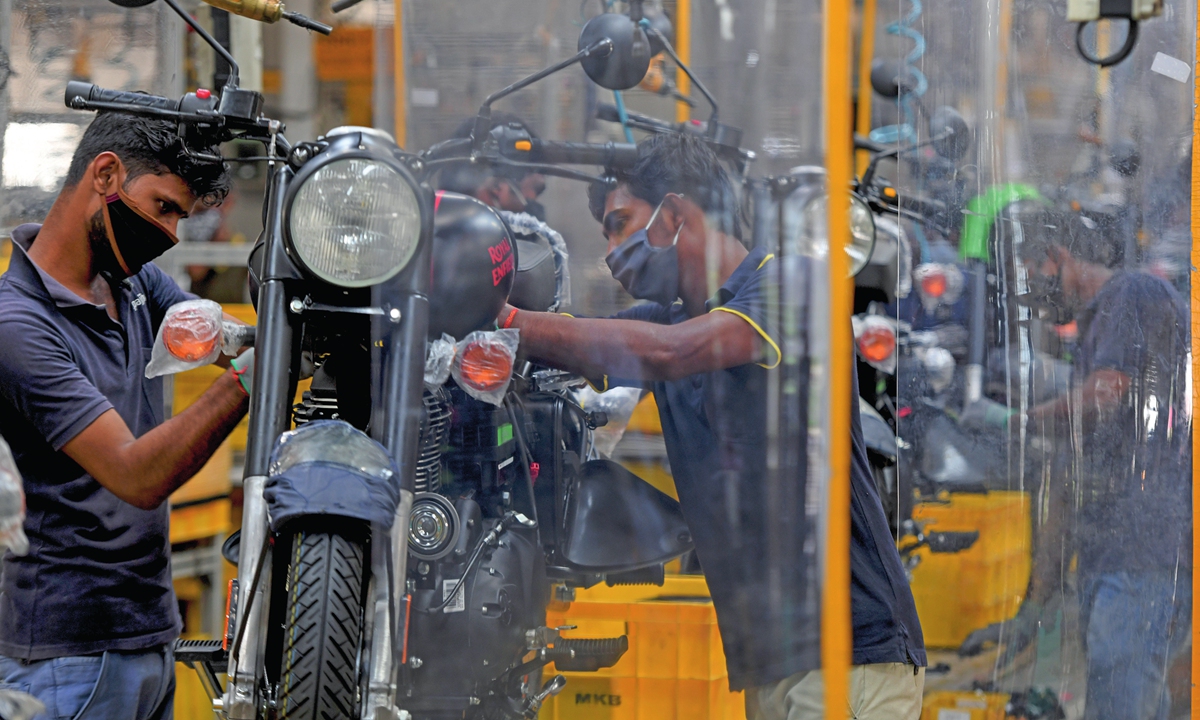Higher trade barriers to worsen fallout of boycott of Chinese items on India’s manufacturing
Source:Global Times Published: 2020/6/20 0:25:55

Workers assemble Royal Enfield motorcycles at a factory in Oragadam, India on Tuesday after the government eased nationwide lockdown measures aimed at preventing the spread of COVID-19. Photo: AFP
More trade barriers reportedly being mulled over by Indian authorities primarily targeting Chinese imports are less likely to materialize, as they tend to worsen the fallout of a boycott campaign on India's push to become a manufacturing power, regional affairs observers said.
Higher trade barriers and import duties are being planned by the Indian government on around 300 items from China and elsewhere, Reuters reported on Friday, citing unidentified Indian government officials. Engineering products, electronics and some medical equipment were reportedly among items being considered under the plan.
India has long been excessively protecting its domestic market, rendering the inclusion of India in talks of the Regional Comprehensive Economic Partnership difficult, said Bai Ming, a research fellow at the Chinese Academy of International Trade and Economic Cooperation.
The push to increase the local market share of Indian industries at the cost of excluding businesses from other countries is short-sighted, Bai told the Global Times on Friday, saying that protectionism amid a boycott campaign does the South Asian economy no good.
The latest border clash triggered discontent among average Indian folk on Chinese offerings, especially everyday items such as phones and home appliances, Liu Xiaodong, the chief representative of the China Council for the Promotion of International Trade (CCPIT) in India, told the Global Times in an exclusive interview on Friday.
The anger complicates the operations of Chinese businesses in India, whose reopening from the coronavirus outbreak locally is progressing slowly, according to Liu, also the executive vice president and secretary-general of the Chamber of Chinese Enterprises in India (CCEI).
Lockdown restrictions were put in place in India in March, resulting in factory and store shutdowns. Less than 50 percent of Chinese businesses' local operations have resumed, Liu said, saying that chartered flights have been arranged to send more than 1,000 Chinese nationals, consisting of students studying in India, Chinese businesspeople and travelers, back to their country.
That means roughly one-third of 3,100 Chinese nationals in India have returned home.
Some of the CCEI's member companies said that they have received a frosty response from their Indian partners in recent days, Liu said. Chinese people residing in the country have been told to stay indoors to remain safe.
The border tension-inflicted boycott, adding to the Indian government's regulatory toughening on foreign investment, notably Chinese investment in the country, would dampen Chinese firms' interest in investing in the local market, which inevitably is not conducive to India's push for its manufacturing, he pointed out.
Manufacturing handsets in India relies on China for 30-40 percent of components, Liu said, noting that the absence of an integral supply chain subjects India to continued investment from China, rather than the other way around.
Though Foxconn's $5 billion investment in the country has yet to bear fruit, Apple seems to be continuing its push to build India into its next source of growth, he added.
All these would add to the burden of Chinese businesses exploring opportunities in the Indian market that's not sufficiently investment-friendly. For instance, Industrial and Commercial Bank of China set up a branch in Mumbai in 2011, but its application for another branch in New Delhi has yet to be approved, Liu said, noting that it's also difficult for Chinese firms to increase their investment.
By the end of 2019, roughly 1,000 Chinese firms have invested in India or opened facilities in the country, involving investments of over $8 billion and creating 200,000 jobs.
Liu said Chinese firms' investment in India has hit $10 billion, calling for efforts to set aside disputes and pursue joint growth.
A most recent example was Zhejiang Jindun Fans Company's announcement on Tuesday that it won a bid for a tunnel ventilation system contract in India worth 26.7 million yuan ($3.8 million).
Global Times
Posted in: MARKETS,CENTRAL & SOUTH ASIA